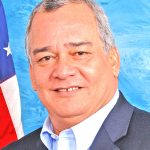Torres, Kilili clash on China ‘parole’
Gov. Ralph DLG Torres and Delegate Gregorio Kilili C. Sablan (Ind-MP) gave contrasting statements on the conditional parole program that allows tourists, like from China, access to visit the CNMI.
The parole authority is reserved for Chinese and Russian tourists, while visitors from Japan and Korea enjoy the visa waiver program.
Sablan, speaking to members of the Society for Human Resource Management-Northern Mariana Islands Chapter yesterday at the Pacific Islands Club Saipan’s Charley’s Cabaret, warned that the parole program “is on shaky ground.”
“As you know, 40 percent of our tourists come in under parole. Our economy needs those tourists. But ever since the Trump administration began, I have been warning parole is on shaky ground. I was ignored. People said ‘it’s a non-issue [and] a rumor with no foundation.’ I wish that were true.
“In February last year, I saw the draft of the presidential executive order that specifically singled out parole in the Marianas for termination. And after 10 years I have enough contacts in Washington to know the briefs and position papers on this issue are still working through the bureaucracy—all headed to the desk of the Secretary of [the Department of] Homeland Security for a decision.”
He added the Trump administration is against parole with the DHS secretary having the discretion of continuing the program or not. “And because any new administration looks at what the previous administration was doing–—and decides whether to change it.”
“In the case of the Trump administration, if Obama was for it, they are against it. And they have been against it, even before President Trump was sworn in.”
Sablan said three Republican senators in the U.S. Congress—Sens. Jeff Sessions, Chuck Grassley, and Mike Lee—wrote then President Obama’s DHS Secretary Jeh Johnson, saying the program violates the prohibition on using parole “to circumvent congressionally established immigration policy” or “to admit aliens who do not qualify for admission under established legal immigration categories.”
Obama, however, continued the program but the Senate staff of Sessions and Grassley that helped draft the letter now works at the DHS under Trump’s presidency.
Sablan said their position on the program remains the same. “They have not changed their minds about parole. And now they are in a position to get rid of it. So, losing parole is not a “non-issue” or a “rumor,” it is a real possibility.”
He added that U.S. Customs and Border Protection Field Operations director Brian J. Humphrey, who is on Saipan, gave him an insider story where the program has always been at the discretion of the DHS secretary.
Sablan said the parole program also caused some problems to the CNMI. “We went from 30,000 Chinese tourists in 2009, when parole started, to 230,000 this year. And we all know about the problems with birth tourism and construction workers coming in as tourists. Parole made that possible.”
“The Marianas is the only place in America, where Chinese can come in without any prior paperwork, the director told me, because of parole. Look, I was successful getting parole in the first place—and not just for tourists, but for caregivers, and immediate relatives of U.S. citizens, and others whose standing here was uncertain.”
He then asked Torres to use his influence on Trump, since he supported his presidential bid. “I think if we are going to keep parole, then it has to be the governor and his people, who convince the President.
“They supported Trump’s election—despite his anti-immigration policies, despite knowing our economy depends on generous immigration. The governor says they have influence with Trump. Now is the time to use it. Before we lose parole.”
‘Politically motivated rumors’
Torres, however, said the issue is only a politically motivated rumor. “Talk has been circulating regarding the status of the CNMI Discretionary Parole Program and it’s nothing more than politically motivated scare tactics aimed at impacting our tourism economy.”
“I am saddened that there are those in the community that would spread a rumor that CBP is in the process of ending this vital program. It’s even worse when political candidates use this issue and express concern about the status when all it takes is making a phone call with the CBP or DHS headquarters to verify.”
He added that his administration has been in communication with federal agencies involved on the issue. “This past week, my staff and I have been in contact with not only the CBP headquarters in Washington, D.C.”
“Also [with] the Department of Interior, [DHS], and the White House. To a person, I was informed that not only is this a rumor, but the status of the program is not even being discussed.”
Torres said he’s been working with CBP to improve the program. “I have been working with CBP to identify ways to improve the process while ensuring that the laws are being followed, so the CNMI economy can continue to grow with a diversified tourism market. I am committed to doing whatever it takes to keep this valuable program intact.”
The news, he added, is because it is an election year. “I fully recognize that political season is upon us, but I am hopeful that all candidates for office refrain from political scare tactics as it only hurts the people of the CNMI that they are trying to represent.”




























